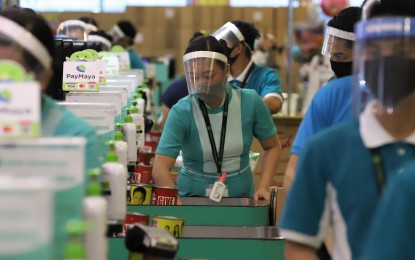The holiday season was always a busy time for 38-year-old Elsa Maniego. Around this time, she and her workmates would be abuzz with helping prepare meals for Christmas gatherings.
But the sounds and smells they are familiar with — the clink of silverware and plates, the aroma of gourmet food — baked fish fillet with spinach and bechamel sauce, tomato and mozzarella bruschetta and other exquisitely prepared dishes — are just a memory.
Maniego lost her job in a catering business because of the government-imposed lockdown designed to stem the spread of the coronavirus (COVID-19).
A single parent, she had to stretch her savings. She now shifts from preparing meals for her family to buying cheap ready-to-eat food.
She is not so hopeful about getting a job at this time as many stores, especially in the food and service industry, have shut down.
This Christmas, Maniego will have to settle for a simple celebration at home with just her children.
“Every Christmas, we would go out with our extended family. But now, we will just spend the day at home and do a video call with relatives to at least know we are celebrating with them like before.”
Many workers in other small enterprises were also let go as businesses lost income because of the mandated temporary shutdown of non-essential shops.
Cynthia Data, 39, was laid off from a massage clinic three months after the lockdown but later found employment as a home-service massage therapist.
Despite the health risks of frequently visiting her clients in their homes, she said she just has to adjust to the new working environment in order to earn a living.

Business as usual for employees at a local supermarket as they work with personal protective equipment. PNA file photo.
Women workers’ rights amid the pandemic
While both men and women lost jobs as a result of the pandemic, female workers, especially in the retail trade and service sector were disproportionately affected, according to Partido ng Manggagawa (PM) Secretary-General Judy Miranda.
“The biggest chunk comprised women working in department stores, restaurants and tourism-related businesses,” she said in a recent webinar organized by the Foundation for Media Alternatives (FMA).
Garment industry workers at the labor-intensive export processing zone in Cebu were also among those retrenched, said Miranda, who serves as spokesperson for the women’s committee of the Nagkaisa Labor Coalition, an alliance of labor groups and workers associations in the country.
“The first ones who were laid off were pregnant women and women with small children because they are high-risk workers if their children ever get infected,” she said, highlighting the discrimination women are up against.
Those workers were not given their much-needed benefits, especially because many contractual workers are women with a floating employment status, Miranda explained.
The unemployment rate in the Philippines hit a record high of 17.7% last April, government statistics showed, as factories and establishments shuttered because of the restrictions on people’s movements.
The rate eased to 10% in July after businesses began to reopen following the lifting of travel curbs.
The labor department has set aside P16 billion as cash aid to workers in both the formal and informal sectors, as well as returning overseas workers, who are grappling with the pandemic.
Labor demands
Miranda urged employers to provide protection and improve the workplace for their employees.
Workers must have access to safe transportation, free PPE (personal protective equipment) and COVID-19 testing, she said. There should also be hazard pay because they are working at a dangerous time, she added.
While the lockdown took a toll on workers, an opportunity opened up for some who adapted to the shift to the digital economy.
Miranda cited the case of displaced garment workers in Cavite who are sewing clothes to sell online. “They are taking advantage of the booming industry of online shopping.”
She said these online communities of women are helping one another in their local businesses. There is coordination among different chapters of PM to exchange their products with one another, she explained.
While Miranda notes the financial boost the online shift has given the women, she says there are no benefits and security in their online work.
Women and the digital economy
Online platform work, including on-demand domestic work, is still in its early stages in the country.
Jessamine Pacis, program officer of FMA, ssid women platform workers are “not protected and cannot receive benefits afforded to workers in the formal economy”.
“As the Philippines undergoes a period of rapid digital transformation, the platform economy is expected to grow exponentially and it is more important than ever to ensure that such economy furthers domestic workers’ rights instead of reinforcing existing unjust conditions,” concluded an FMA study on digitization and domestic work, which was carried out before the pandemic.
Pacis, who touched base earlier this year with some women in the study, said: “Domestic workers, especially live-out workers, are among the worst affected by the pandemic, considering that many are still part of the informal economy and the nature of their work exposes them to a high level of risk.”
The FMA study also recommends that the government define labor standards for platform work as decent work.
“Similar to the recommendations of the ILO (International Labor Organization) on digital platforms and the future of work (2017), this study recommends that the government adapt regulations and policies on decent work, including the provision of social benefits, to those engaged in digital work,” it said.
“Government agencies mandated to promote work on platforms should also expand focus from job creation to job security and social protections.”